动物的智慧.英文 演示文稿ppt
- 格式:ppt
- 大小:1.47 MB
- 文档页数:9
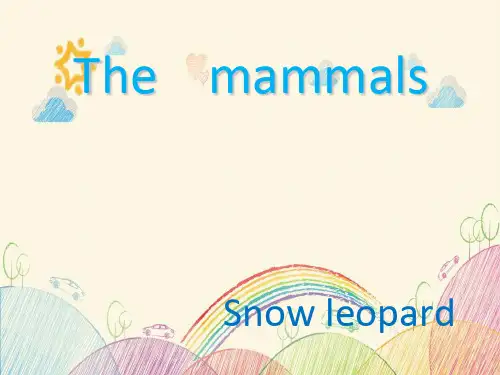
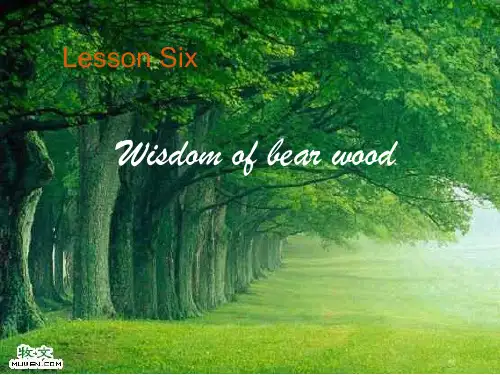

小学生英语故事——猴子的智慧(英文稿)Hello . I am***。
T oday I will tell you a story. The name of the story is《The monkey 's wisdom》.One day, rabbit recived a letter from her mother.“My baby ,I was sick, I miss you .”mother said.“Oh, My mother is sick, I must go home now.”so the rabbit started.When the rabbit came to a tree. He heard a great voice say.“Watch out,Rabbit !”The monkey said. “Uaaah! What happened?”The rabbit asked.“Sorry,Rabbit !Look do wn near your feet ! There’s a pit .”The monkey answered.“Oh,it’s very deep.Thanks a lot ! Monkey !”The rabbit went on.“Rabbit,stop there !Where are you going ?”The wolf asked.“Hello,Mr wolf. My mother is sick.She’s waiting for me.I must go home now.”The rabbit answered.“But you can’t go!”Wolf said.“Why not ?”“Because you are my lunch ! Ha,ha,ha !”“Oh,no ! You are wrong !He is my lunch!”A fox jumped out and said.“What are you talking about ?”“The rabbit is my lunch !”So,the wolf and the fox fight each other up.“Don’t fight , please .I have an idea .Have a race.The winner eats the rabbit .”The monkey said .“That’s a good idea !”The wolf and the fox to say .“Are you ready ? One,two,three,start !”“Monkey ! How could you do this to me ? We are good friends .”The rabbit is crying to say .“No,no,Rabbit !Don’t get me wrong !Do you remember the pit ?”“Pit ?Ah-ha !You are smart !”The rabbit laughs .Before long, The monkey and the rabbit hears the voice of the wolf and the fox“Monkey ,You tricked us ! We hate you.”T he wolf and the fox fall down the pit .。
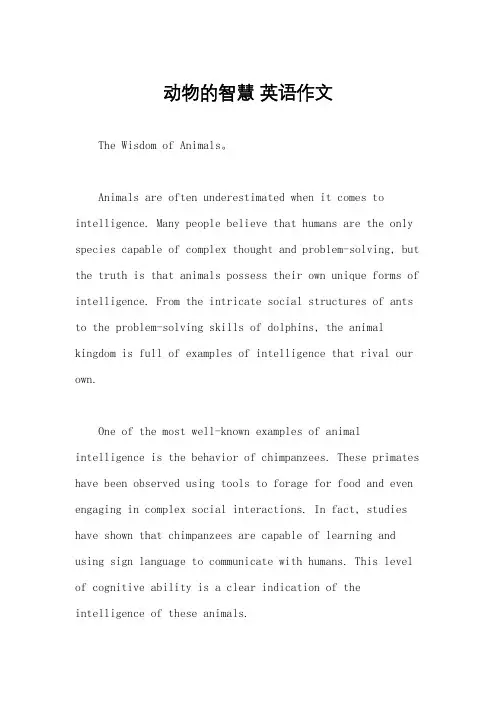
动物的智慧英语作文The Wisdom of Animals。
Animals are often underestimated when it comes to intelligence. Many people believe that humans are the only species capable of complex thought and problem-solving, but the truth is that animals possess their own unique forms of intelligence. From the intricate social structures of ants to the problem-solving skills of dolphins, the animal kingdom is full of examples of intelligence that rival our own.One of the most well-known examples of animal intelligence is the behavior of chimpanzees. These primates have been observed using tools to forage for food and even engaging in complex social interactions. In fact, studies have shown that chimpanzees are capable of learning and using sign language to communicate with humans. This level of cognitive ability is a clear indication of the intelligence of these animals.Another example of animal intelligence can be found in the behavior of elephants. These majestic creatures have been observed displaying a deep understanding of their environment and the ability to problem-solve in complex situations. For example, elephants have been known to work together to rescue a fellow elephant from a dangerous situation, demonstrating a high level of empathy and cooperation.Dolphins are also known for their intelligence, with their ability to communicate using a complex system of vocalizations and body language. They have been observed using tools and working together to solve problems, demonstrating a high level of cognitive ability. In fact, some researchers believe that dolphins may even possess a form of self-awareness, which is a hallmark of higher intelligence.Even animals that are often seen as simple or unintelligent, such as ants, display remarkable levels of intelligence in their behavior. Ants are capable oforganizing themselves into complex societies withspecialized roles for different members of the colony. They are also known for their ability to problem-solve and adapt to changes in their environment, demonstrating a high level of cognitive ability.In addition to these examples, there are countlessother instances of animal intelligence in the natural world. From the problem-solving skills of octopuses to the complex social structures of wolves, the animal kingdom is full of examples of intelligence that rival our own.It is important for us to recognize and appreciate the intelligence of animals. By doing so, we can gain a greater understanding of the natural world and our place within it. We can also learn valuable lessons from the behavior of animals, such as the importance of cooperation and empathy.In conclusion, animals possess their own unique formsof intelligence that rival our own. From the problem-solving skills of chimpanzees to the complex social structures of ants, the animal kingdom is full of examplesof intelligence that deserve our respect and admiration. By recognizing the intelligence of animals, we can gain a greater appreciation for the natural world and the remarkable creatures that inhabit it.。


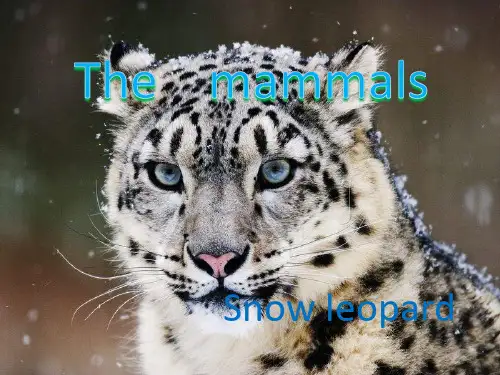
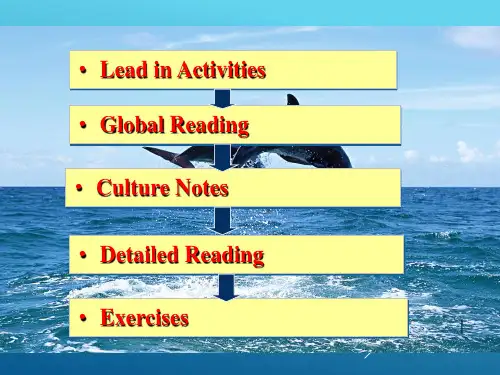
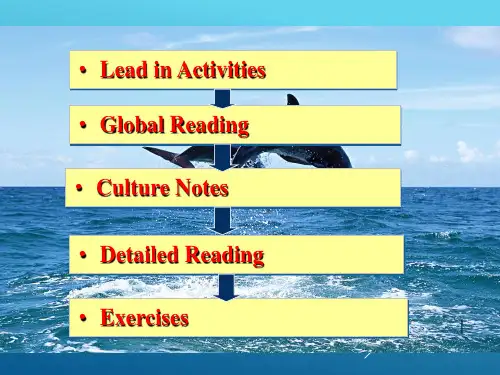

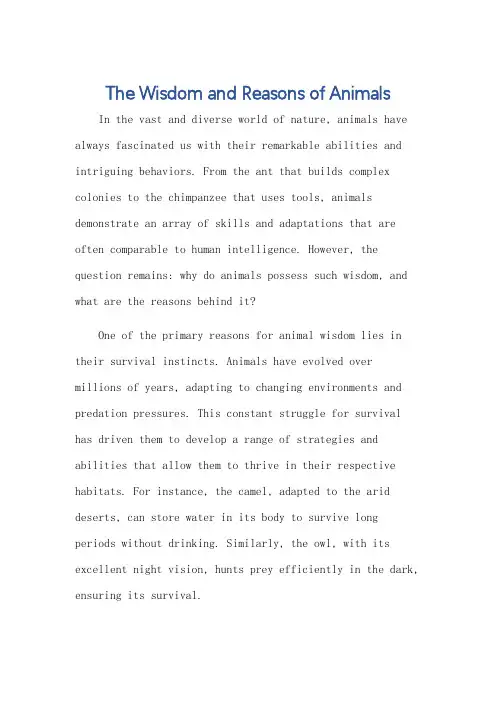
The Wisdom and Reasons of AnimalsIn the vast and diverse world of nature, animals have always fascinated us with their remarkable abilities and intriguing behaviors. From the ant that builds complex colonies to the chimpanzee that uses tools, animals demonstrate an array of skills and adaptations that are often comparable to human intelligence. However, the question remains: why do animals possess such wisdom, and what are the reasons behind it?One of the primary reasons for animal wisdom lies in their survival instincts. Animals have evolved overmillions of years, adapting to changing environments and predation pressures. This constant struggle for survival has driven them to develop a range of strategies and abilities that allow them to thrive in their respective habitats. For instance, the camel, adapted to the arid deserts, can store water in its body to survive long periods without drinking. Similarly, the owl, with its excellent night vision, hunts prey efficiently in the dark, ensuring its survival.Another reason for animal wisdom is their social structure and behavior. Many animals live in complex social groups, where they must cooperate and coordinate their actions to survive. This social interaction requires a high level of intelligence and understanding among individuals. For instance, wolves hunt in packs, using a combination of strategies and signals to bring down larger prey. This behavior requires a high level of communication and cooperation among the members of the pack.Furthermore, animals display remarkable adaptive abilities, allowing them to adjust to new environments and changing conditions. This adaptability is often the result of genetic variations that allow individuals to thrive in new environments. For instance, certain species of fish have evolved to live in extremely cold waters, developing antifreeze proteins in their bodies to prevent ice formation.However, it is important to note that while animals may possess remarkable abilities, their intelligence and behavior are often limited by their evolutionary history and biological constraints. They lack the cognitiveflexibility and problem-solving abilities that humans possess, due to our larger brains and more complex social and cultural systems.In conclusion, animals possess remarkable wisdom and abilities that are often comparable to human intelligence. This wisdom is the result of their survival instincts,social structures, and adaptive abilities. However, their intelligence and behavior are limited by their evolutionary history and biological constraints. Understanding the reasons behind animal wisdom not only helps us appreciate their remarkable abilities but also provides insights into the evolution and adaptation of species in nature.**动物的智慧与原因**在广阔而多样的自然界中,动物以其非凡的能力和引人入胜的行为一直让我们着迷。
动物的智慧英语作文Animal Wisdom。
Animals have always been a source of fascination for humans. Their behavior, instincts, and survival skills have often been a subject of study and admiration. The wisdom of animals is something that has intrigued humans for centuries, and there is much that we can learn from them.One of the most remarkable aspects of animal wisdom is their ability to adapt to their environment. Whether it is a polar bear in the Arctic or a camel in the desert, animals have an innate understanding of their surroundings and how to survive in them. They are able to find food, shelter, and water in the most challenging of environments, and their ability to adapt is truly remarkable.Another aspect of animal wisdom is their social behavior. Many animals live in groups or communities, and they have complex social structures and communication systems. From elephants to dolphins, animals have been observed to display empathy, cooperation, and even altruism. They take care of their young, protect their territory, and work together to ensure the survival of their group. Humans can certainly learn a lot from the way animals interact and care for each other.Furthermore, animals have a deep understanding of their own bodies and instincts. They know when to rest, when to hunt, and when to seek shelter. Their instincts guide them in their daily lives, and they are able to sense danger and opportunities in ways that humans often cannot. This innate wisdom is something that humans can learn from, as it teaches us to trust our instincts and listen to our bodies.In addition to their instincts, animals also display remarkable problem-solving skills. From using tools to outsmarting predators, animals have been observed to use their intelligence to overcome challenges. Whether it is a bird building a nest or a chimpanzee using a stick to extract termites from a mound, animals are constantly using their intelligence to survive and thrive in their environment.Finally, animals also display a deep connection to the natural world. They are in tune with the rhythms of nature, and they understand the importance of balance and harmony. They do not take more than they need, and they live in harmony with their environment. This wisdom is something that humans can certainly learn from, as it teaches us to respect and protect the natural world.In conclusion, animals possess a wisdom that is truly remarkable. From their ability to adapt to their environment, to their social behavior, instincts, problem-solving skills, and their connection to the natural world, there is much that humans can learn from them. By observing and studying animals, we can gain valuable insights into how to live in harmony with the natural world and with each other. The wisdom of animals is something that should be treasured and respected, as it has much to teach us about how to live our lives.。
动物的智慧英语作文Title: The Wisdom of Animals。
Introduction:Animals have long fascinated humans with their remarkable intelligence and adaptability. From the cunning of the fox to the problem-solving skills of the octopus, the animal kingdom is rich with examples of intelligence in various forms. In this essay, we will explore the depths of animal intelligence and its implications for our understanding of the natural world.The Complexity of Animal Intelligence:Contrary to traditional beliefs, intelligence in animals extends far beyond mere instinctual behaviors. Studies have revealed astonishing cognitive abilities in numerous species, challenging our perceptions of what it means to be intelligent. For instance, research on primatessuch as chimpanzees and orangutans has demonstrated their capacity for advanced problem-solving, tool use, and even cultural transmission of knowledge within their communities.Communication and Social Intelligence:Communication lies at the heart of social interactions among animals, showcasing their remarkable ability toconvey information and emotions through various means. From the intricate dances of bees to the complex vocalizationsof dolphins, animals employ diverse communicationstrategies to navigate their social environments. Moreover, the intricate social structures observed in species like elephants and wolves highlight their capacity for empathy, cooperation, and even strategic planning.Tool Use and Innovation:One of the hallmarks of intelligence is the ability to use tools to accomplish tasks, a skill once thought to be unique to humans. However, numerous examples acrossdifferent taxa challenge this assumption. Crows, forinstance, have been observed crafting tools out of twigs to extract insects from crevices—a behavior indicative of complex problem-solving and innovation. Similarly, the use of rocks as anvils by sea otters to crack open shellfish showcases their resourcefulness and adaptability in foraging strategies.Learning and Adaptation:Animals exhibit impressive learning capabilities, allowing them to adapt to changing environments and solve novel challenges. From the trial-and-error learning of rats in mazes to the observational learning of meerkats in detecting predators, animals employ various strategies to acquire and apply knowledge. Moreover, the ability of certain species, such as ravens and parrots, to mimic human speech underscores their cognitive flexibility and capacity for learning complex tasks.Emotional Intelligence and Empathy:Beyond cognitive abilities, animals also displayemotional intelligence and empathy, forging deep bondswithin their social groups and demonstrating care and compassion towards others. Instances of altruistic behavior, such as dolphins aiding injured companions or elephants mourning the loss of family members, highlight theemotional depth and social complexity present in the animal kingdom. Such behaviors challenge the notion of humans as the sole possessors of empathy and compassion.Implications for Conservation and Ethical Considerations:Recognizing the intelligence and complexity of animals has profound implications for conservation efforts and ethical considerations regarding their treatment. As wegain a deeper understanding of animal cognition and behavior, it becomes increasingly imperative to reassessour relationship with other species and strive for more compassionate and sustainable coexistence. Moreover, acknowledging the sentience and intrinsic value of animals compels us to advocate for their welfare and protection against exploitation and cruelty.Conclusion:In conclusion, the study of animal intelligence unveils a rich tapestry of cognitive abilities, social dynamics, and emotional depth within the natural world. From problem-solving prowess to empathetic connections, animals continuously defy our preconceived notions and invite us to marvel at the wonders of their minds. By embracing a more holistic understanding of intelligence, we not only enrich our appreciation of the diversity of life but also foster a deeper sense of empathy and stewardship towards our fellow inhabitants of this planet.。